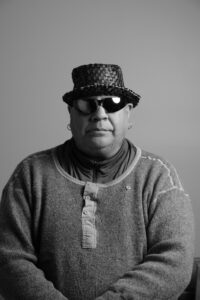Joseph A. Dandurand
Poet; Director, Kwantlen Cultural Centre
General Arts and Science (Theatre/Performing Arts), Class of 1990
Joseph Dandurand’s calendar has never been so full.
At first light, you might find the Kwantlen First Nation writer working on a film script, short stories or poems. Later in the day, he could be teaching storytelling to children in one of three different school districts or attending to his duties as the Heritage/Lands Officer, researcher and archeologist for his people. And thanks to Zoom, on any given day he might be giving virtual readings of his widely admired poetry to audiences near and far.
“What I love about Zoom,” Dandurand says, “is that one night I might be reading to people in New York and on another I’ll be reading to an audience in the Philippines. It’s great. Readings are always interesting. And on Zoom,” he notes with a light laugh, “no one can throw anything at you.”
The world has caught up with Dandurand. Today he is one of Canada’s most published and honoured writers, with – among other publications – 12 books of poetry to his credit, including I Want (Leaf Press, 2015), Hear and Foretell (Bookland Press, 2015) and The Rumor (Bookland Press, 2018). His most recent volumes are SH:LAM (The Doctor), released by Mawenzi Press in April 2019, shortlisted for the 2020 Dorothy Livesay Prize, and The East Side of It All (Harbour Publishing, 2020). The latter, set in Vancouver, was a finalist for this year’s $65,000 Griffin Poetry Prize.
Long ago, Dandurand was a troubled and aimless youth. Both his mother and father were in the Canadian military and he grew up on various bases. Over time, his troubles grew and became crippling. He dropped out of school in Grade 9, was an alcoholic at 19 and a drug addict at 26.
A proud husband and father of three children today, he doesn’t dramatize his past troubles or how he was able to recover from his addictions. He says simply that at one point, “I woke up.”
As he got back on his feet and on his way toward a new life, he aspired to become an actor and entered Algonquin College in the General Arts and Science (Theatre/Performing Arts) program. Among his classes was a creative writing course. One day he brought one of his short stories to class and read it aloud. He was stunned by the response.
“There was absolute silence until the teacher, Tom Shepherd, spoke up and said I should keep on writing,” he says. The remark was completely unexpected. “I hadn’t had that kind of encouragement before. Because I had dropped out of high school, I knew nothing about grammar. But I thought, OK, if he sees something in my work, I would keep at it.”
Being an actor remained his life’s goal, however, and after graduating with the Class of 1990, he went to study theatre and directing at the University of Ottawa. This did not go as well as he hoped. In his third year, one of his teachers told him bluntly he should be doing something else. “I wasn’t giving it my all. I just wasn’t devoted to the craft. But I’d been writing and when I graduated, it was my writing that began to open doors for me.”
Case in point: His theatre studies might not have transformed him into an actor, but what he learned served him well in writing for the stage. He has produced several plays for adults and youth, including works as playwright-in-residence for the Museum of Civilization in Hull in 1995 and for Native Earth in Toronto in 1996. Dandurand was also playwright-in-residence at the National Arts Centre in Ottawa in 2008.
His work explores the heritage of the Kwantlen people as well as his own and his family’s journey through an often unforgiving world. His evocative St. Mary’s poems (published in 2000 in the volume, looking into the eyes of my forgotten dreams) derive in part from stories his mother would tell of her time at a residential school near Mission, B.C. SH:LAM explores the experience of the Kwantlen people as they declined from a thriving West Coast culture to the approximately three hundred who survive today in the wake of smallpox epidemics that wiped out 80 per cent of their people. The Toronto Star hailed SH:LAM as a collection of “powerful visionary parables of suffering, redemption and retribution.”
Dandurand describes himself simply as a storyteller. “I teach my kids that each of us has a gift,” he says. “I believe that my gift is to tell stories.” He does so through his poems as well as his contributions to a long list of anthologies. He’s happy to explore new genres as opportunities arise. His current project is the script for a children’s film. He says he has maintained a routine for many years of rising at 5 a.m. to begin his writing. If he’s driven to write short stories, he might produce one story a day; if poetry is his priority, he might create one or two poems a day.
“I’m always writing something,” he says. “And as I’m finishing one project, I’m already thinking of the next one. It’s a constant process.”